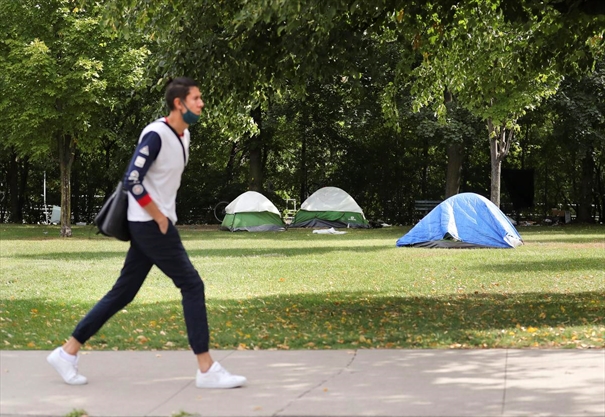An Ontario court has denied a request for an injunction that would have prevented Toronto from enforcing its prohibition on tents in city parks for the rest of the pandemic.
In the decision released Wednesday, Judge Paul Schabas cautioned that he wasn’t directing the city to remove the homeless encampments in city parks, and urged it to recognize that the situation was evolving.
“My decision is based on evidence that dates from the summer months when the incidence of COVID-19 was low, the weather was warm, and the city had specific concerns about particular group encampments,” Schabas wrote.

He also noted that the city had taken “significant steps” to respond to the threat of COVID-19 in shelters since the pandemic struck.
The city has to consider how and when to enforce its bylaws now, he wrote, based on the availability of safe shelter spaces and the impact of encampments on parks and the public.
While Schabas accepted that some of the applicants — a group consisting of several current and former encampment residents, the Toronto Overdose Prevention Society and the Ontario Coalition Against Poverty — feared being exposed to COVID-19 in shelters, he ruled the evidence before the court didn’t satisfy that “broad relief” was justified, even temporarily.
Calling homelessness an “unfortunate reality,” he said the city needed tools to address situations where public health and safety was jeopardized, or where the public’s use of parks was limited or prevented. Encampments, he wrote, impaired the use of park spaces — particularly during the pandemic when outdoor spaces were needed for activities that couldn’t be done indoors.
Arguments over the potential encampment injunction were , the same day as a separate hearing about distancing standards in Toronto’s shelter system. That case , with the city found by a judge to have breached its obligations under a settlement about COVID precautions in its homeless shelters.
Lawyers representing the applicants in the encampment suit argued that encampments alleviated stress and uncertainty for homeless people, by providing consistency around where they got their meals, relieved themselves, charged phones and slept at night. They argued encampments offered more consistent access to pharmacies, safe consumption sites and medical care.
The city meanwhile argued that the encampments posed “serious dangers” to those living in them, as well as city staff and the public.
“The city has made a policy decision to invest its scarce resources in making safer indoor spaces available to as many people as possible, rather than building infrastructure to support living within parks,” it wrote in submitted materials.
The city told the court it hadn’t taken steps to dismantle encampments since the case started, though it continued to make efforts to move people into shelters or other indoor housing.
Zoe Dodd, co-founder of the overdose prevention society, said she was disappointed to see Schabas’ decision. She said that the separate court ruling last week had shown the city wasn’t meeting safe distancing standards in its shelters.
She said it didn’t make sense that people in Toronto were advised not to see their families on Thanksgiving, nor celebrate Halloween, while the city was downtown this winter.
The applicants’ lawyers were deciding whether an appeal was possible, she said.
Dodd specifically took issue with Schabas’ conclusion that encampments impaired the public’s use of parks, arguing that those experiencing homelessness are part of the public.
In a statement, the city said it would continue trying to create capacity for those living in encampments to move indoors. According to the city, since March more than 948 people had been moved from encampments to indoor spaces — with 62 encampments cleared this year.
“Today’s ruling does not order the city to clear encampments,” according to the city’s statement, “rather the ruling does not prevent the city from clearing an encampment when shelter and housing options become available to those living in encampments or as required by the circumstances.”
Following the ruling, Mayor John Tory told reporters he understood that people needed better housing options in the city, and pledged to provide “as broad a range of options as possible” to those currently living in encampments — especially as the winter months approach.
With a file from Francine Kopun
Victoria Gibson is a Toronto-based reporter for the Star covering affordable housing. Her reporting is funded by the Canadian government through its Local Journalism Initiative. Reach her via email:
